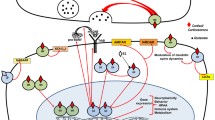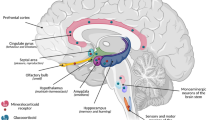Résumé
Les glucocorticoïdes sont des dérivés de synthèse chimique du cortisol. Leur utilisation thérapeutique, découverte au début des années 50, s’est depuis largement développée. Rapidement les cliniciens ont constaté l’émergence de troubles neuropsychiatriques induits par ces traitements.
Les glucocorticoïdes se font médiateurs, via leurs récepteurs cérébraux, des effets sur la transduction des signaux, mais également sur la structure et la viabilité des neurones. Cela est particulièrement bien connu pour les neurones hippocampiques. L’action de ces molécules sur les structures cérébrales plus complexes à aborder reste mal connue chez l’homme. Les troubles cognitifs aigus induits par les corticoïdes sont très fréquents, rapidement réversibles et le plus souvent d’intensité modérée, difficilement détectables. Ces troubles semblent spécifiquement concerner les processus de mémoire dépendant de l’hippocampe (mémoire verbale). Les troubles cognitifs chroniques secondaires aux corticothérapies sont rares et complexes, incompatibles avec une atteinte hippocampique isolée.
Les sujets recevant une corticothérapie doivent être systématiquement prévenus des potentiels effets secondaires psychiatriques du traitement prescrit. Ils doivent être revus rapidement après l’instauration de la corticothérapie, en particulier lorsque la dose quotidienne est supérieure à 40 mg d’équivalent predni-sone - la dose étant le seul facteur de risque clairement établi des troubles neuropsychiatriques induits par les corticoïdes. Le geste préventif le plus consensuel est la prescription des doses minimales nécessaires au traitement de la pathologie sous-jacente. Après avoir vérifié l’absence d’étiologie organique aux symptômes psychiatriques et cognitifs observés, le premier geste thérapeutique recommandé est la diminution ou l’arrêt de la corticothérapie. Si cette option thérapeutique s’avère impossible en raison de la gravité de la maladie somatique sous-jacente, la prescription d’un traitement psychotrope est envisageable. Une seule étude suggère l’efficacité de la Lamotrigine.
Abstract
Glucocorticoids are derived from chemical synthesis of cortisol. They have been extensively used since their discovery in the fifties. Physicians immediately noticed emergent corticosteroids-induced adverse neuropsychiatric effects.
Glucocorticoids mediate, via cerebral receptors, effects on both signals transduction and neurones structure and viability. Their actions on hippocampal neurons are well documented, in contrast to those on more complex cerebral structures.
Acute cognitive induced disorders are common although moderate and hardly detectable without sensitive cognitive tests. These cognitive alterations specifically affect hippocampal dependant memory process. Chronic cognitive disorders are uncommon, complex, and inconsistent with an isolated alteration of the hippocampal structure.
Patients treated with corticoids should be systematically told about potential neuropsychiatric side-effects of the therapy. Especially when daily doses are higher than 40 mg equivalent prednisone, a medical checking should be made by the physician rapidly after starting corticotherapy. Actually daily dose is the only risk factor of glucocorticoids induced neuropsychiatric disorders clearly established. Thus, preventive therapy is the prescription of minimal daily doses necessary to cure underlying somatic pathology. After ruling out organic aetiology of psychiatric and cognitive symptoms, reduction or stopping the corticotherapy is the first advised therapeutic management step. Depending upon the seriousness of the underlying somatic illness, this therapeutic step may be impossible. If so psychotropic drugs prescription is conceivable. A single study suggest efficiency of Lamotrigine.
Similar content being viewed by others
Références
Addison T. 1855.On the constitutional and local effects of disease of the suprarenal capsules.
American Psychiatric Association. 1994.Diagnostic and statistical manual of mental disorders (4th ed). Washington: American Psychiatric Association.
Beckwith B.E., Petros T.V., Scaglione C, Nelson J. 1986. Dose-dependent effects of hydrocortisone on memory in human males.Physiology Behavior. 36(2): 283–286.
Bender B.G., Lerner J.A., Poland J.E. 1991. Association between corticosteroids and psychologic change in hospitalized asthmatic children.Ann Allergy May 66 (5): 414–9.
The Boston Collaborative Drug Surveillance Program. 1972. Acute adverse reaction to prednisone in relation to dosage.Clin. Pharmacol. Ther. 13 (5): 693–698.
Brown E.S.et al. 2004. Hippocampal volume, spectroscopy, cognition and mood in patients receiving corticosteroid therapy.Biol. Psychiatry 55: 538–545.
Brown E.S.et al. 2003. Effect of lamotrigine on mood and cognition in patients receiving chronic exogenous corticosteroids.Psychosomatics 44 (3): 204–208.
Cameron O.G., Addy R.O., Malitz D. 1985. Effects of ACTH and prednisone on mood: incidence and time of onset.International journal of Psychiatry in Medicine 15(3): 213–223.
Clark L.D., Bauer W, Cobb S. 1952. Preliminary observations on mental disturbances occurring in patients under therapy with cortisone and ACTH.The New England Journal of Medicine 246 (6): 205–216.
Clark L.D., Quarton G.C., Cobb S., Bauer W. 1953. Further observations on mental disturbances associated with cortisone and ACTH therapy.The New England Journal of Medicine 249 (5): 178–183.
Denburg S.D., Cabotte R.M., Denburg J.A. 1994. Corticosteroids and neuropsychological functioning in patients with systemic lupus erythematosus. 9: 1311–1320.
Glaser G.H. 1953. Psychotic reactions induced by corticotrophin (ACTH) and cortisone.Psychosomatic Medicine 15 (4): 280–291.
Gould E., Tanapat P., McEwen B.S., Flügge G., Fuchs E. 1998. Proliferation of granule cell precursors in the dentate gyrus of adult monkeys is diminished by stress.Proc. Ntl. Acad. Sci. USA. Neurobiology 95: 3168–3171.
Hall R.C.W., Popkin M.K., Stickney S.K., Gardner E.R. Presentation of the steroid psychoses. 1979. The Journal of Nervous and Mental Disease. 167: 229–236.
Hench P.S., Slocumb S.C., Polley H.F., Kendall E.C. 1950. Effects of cortisone and pituitary adrenocorticotropic hormone (ACTH) on rheumatic diseases.JAMA 144: 1327–1335.
Ismail K., Wessely S. 1995. Psychiatric complications of corticosteroid therapy.Br. J. Hosp. Medicine 53 (10): 495–499.
Keenan P.A., Jacobson, M.W., Soleymani R.M., Mayes M.D., Stress M.E., Yaldoo D.T. 1996. The effect on memory of chronic prednisone treatment in patient with systemic disease.Neurology 47: 1396–1402.
Kershner P., Wang-Cheng R. 1989. Psychiatric side effects of steroid therapy.Psychosomatics 30 (2): 135–139.
Kirschbaum C, Wolf O.T., May M., Wippich W, Hellhammer D.H. 1996. Stress- and treatment - induced elevations of cortisol levels associated with impaired declarative memory in healthy adults.Life Science. 58: 1475–83.
Lawrence M.S., Sapolsky R.M. 1994. Glucocorticoids accelerate ATP loss following metabolic insults in cultured Hippocampal neurons.Brain Research 646: 303–306.
Lewis D.A., Smith R.E. 1983. Steroidinduced psychiatric syndromes. A report of 14 cases and a review of the literature.Journal of Affective Disorders 5: 319–332.
Ling M.H., Perry P.J., Tsuang M.T. 1981. Side effects of corticosteroid therapy. Psychiatric Aspects.Arch Gen Psychiatry 38: 471–477.
Lupien S.J., McEwen B.S. 1997. The acute effects of corticosteroids on cognition: integration of animal and human model studies.Brain Research Reviews 24: 1–27.
Magarinos A.M., Garcia Verdugo J.M., McEwen B.S., 1997. Chronic stress alters synaptic terminal structure in hippocampus.Proc. Natl. Acad. Sci. USA. Neurobiology 94: 14002–14008.
McEwen B.S.et al. 1994. Resolving a mystery: progress in understanding the function of adrenal steroid receptors in hippocampus.Progress in Brain Research 100: 149–155.
McKittrick C.R., Magarinos A.M., Blanchard D.C., Blanchard R.J., McEwen B.S., Sakai R.R. 2000. Chronic social stress reduces dendritic arbors in CA3 of hippocampus and decreases binding to serotonin transporter sites.Synapse 36: 85–94.
Naber D., Sand P., Heigl B. 1996. Psychopathological and neuropsychological effects of 8-days corticosteroid treatment. A prospective study.Psychoneuroendocrinology 21 (1): 25–31.
Newcomer J.W., Craft S., Hershey T., Bardgett M.E. 1994. Glucocorticoid-induced impairment in declarative memory performance in adult humans.The Journal of Neuroscience 14 (4): 2047–2053.
Oliveri R.L., Sibilia G., Valentino P., Russo C, Romeo N., Quattrone A. 1998. Pulsed methylprednisolone induces a reversible impairment of memory in patients with relapsing-remitting multiple sclerosis.Acta Neurol. Scand. 97: 366–369.
Olsen E.A., Carson S.C., Turney E.A. 1992. Systemic steroids with or without 2% topical minoxidil in the treatment of alopecia areata.Arch. Dermatol 128 (4): 1467–1473.
Preda A., Fazeli A., McKay B.G., Bowers M., Mazure C.M. 1999. Lamotrigine as prophylaxis against steroid-induced mania.J. Clin. Psychiatry 60: 708–709.
Reckart M. D., Eisendrath S.J. 1990. Exogenus corticosteroid effects on mood and cognition: case presentations. Int. J. Psychosomatic. 37(1-4): 57–61.
Sapolsky R.M., Packan D.R., Vale W.W. 1988. Glucocorticoid toxicity in the hippocampus: in vitro demonstration.Brain Research 453: 367–371.
Sapolsky R.M., Uno H., Rebert C.S., Finch C.E. 1990. Hippocampal damage associated with prolonged glucocorticoid exposure in primates.The journal of Neuroscience 10 (9): 2897–2902.
Stiefel FC, Breitbart WS., Holland J.C. 1989. Corticosteroids in cancer: Neuropsychiatric complications.Cancer Investigation 7 (5): 479–491.
Stoudemire A., Anfinson T., Edwards J. 1996. Corticosteroid-induced delirium and dependency.General Hospital Psychiatry 18: 196–202.
Suess W.M., Stump N., Chai H., Kalisker A. 1986. Mnemonic effects of asthma medication in children.Journal of Asthma 23(6): 291–296.
Uno H.et al. 1990. Brain damage induced by prenatal exposure to Dexamethasone in fetal rhesus macaques. I. Hippocampus.Developmental Brain Research 53: 157–167.
Varney N.R., Alexander B., Maclndoe J.H. 1984. Reversible steroid dementia in patients without steroid psychosis.Am J Psychiatry 141: 369–372.
Virgin Jr C.E.et al. 1991. Glucocorticoids inhibit glucose transport and glutamate uptake in hippocampal astrocytes: implications for glucocorticoids neurotoxicity.Journal of Neurochemistry 57: 1422–1428.
Watanabe Y., Gould D., Daniels D.C., Cameron H., McEwen B.S. 1992. Tianeptine attenuates stress-induced morphological changes in the hippocampus.European Journal of Pharmacology 222: 157–162.
Wolkowitz O.M., Reus V.I., Canick J., Levin B., Lupien S. 1997. Glucocorticoid medication, memory and steroid psychosis in medical illness.Annals New York Academy of Sciences 823: 81–96.
Wolkowitz O.M.et al. 1990. Cognitive Effects of Corticosteroids.Am. J. Psychiatry 147 (10): 1297–1303.
Wolkowitz O.M.et al. 1993. Steroid modulation of human memory: biochemical correlates.
Zanardi V.A., Magna L.A., Costallat L.T.L. 2001. Cerebral atrophy related to corticotherapy in Systemic Lupus Erythematosus (SLE).Clinical Rheumatology. 20: 245–250.
Author information
Authors and Affiliations
Corresponding author
Rights and permissions
About this article
Cite this article
Cornic, F., Caroli, F. Les troubles cognitifs induits parles traitements glucocorticoïdes. Psychiatr Sci Hum Neurosci 4, 11–19 (2006). https://doi.org/10.1007/BF03028394
Issue Date:
DOI: https://doi.org/10.1007/BF03028394




